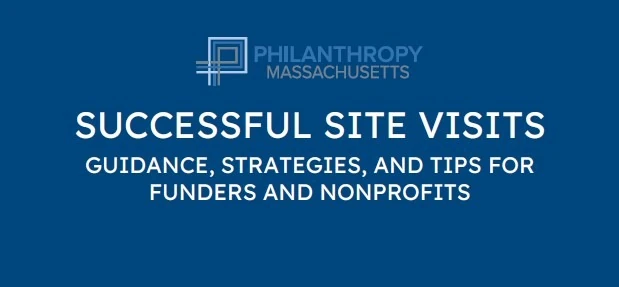Maryland Philanthropy Network's Health Funders Affinity Group invites you to join Megan Renfrew, Deputy Director of Policy and Consumer Protection with the Maryland Health Services Cost
 Site Visit Guide and Resources
Site Visit Guide and Resources
Nonprofit organizations often receive visits from donors and representatives of philanthropic institutions. These meetings are usually held at the nonprofit's location as part of a funder’s grant review or monitoring process and can lead to a deepening of the relationship...
FIND MORE BY:
RESOURCE FOR MEMBERS ONLY
FIND MORE BY:
This is the first session of a 6-part webinar series on trust-based philanthropy focused on addressing common questions, clarifying misconceptions, and exploring ways to overcome obstacles in implementing trust-based philanthropy. In this session, we will clarify the misperception that trust-based philanthropy means unconditional trust and dig into the nuances of why trust is an important vehicle for more equitable funder-grantee relationships. Speakers will share how they have cultivated (and maintained) trust, how they model and reinforce mutual accountability in a trust-based way, and how they have worked through challenging moments when trust breaks down.
This is the third session of a 6-part webinar series on trust-based philanthropy focused on addressing common questions, clarifying misconceptions, and exploring ways to overcome obstacles in implementing trust-based philanthropy. In this session, we will explore the notion of risk – and how to reframe our understanding and analysis of risk to consider the reciprocal nature of the funder-grantee relationship. We’ll hear from Stacey Faella, Woodcock Foundation; Shruti Jayaraman, Chicago Beyond; and Mynor Veliz, Headwaters Foundation all funders who have implemented trust-based values and practices in their due diligence process and have identified ways to bridge the gap between donor/board desires and grantee needs.
Held in partnership with the Trust-Based Philanthropy Project, this is the fifth session of a 6-part webinar series on Demystifying Trust-Based Philanthropy. During this session, we will unpack these important nuances and will highlight examples of how grantmakers are relying on rigor and continuous learning to understand impact. Participants can expect to gain a clear understanding of trust-based philanthropy’s three-pronged approach to learning and evaluation, as well as concrete tools they can use to implement in their own work. Each session will provide dedicated space for small-group peer dialogue with other MPN members about ways to implement these practices into your grantmaking.
Join Maryland Philanthropy Network and the Trust-Based Philanthropy Project for the last webinar in this 6-part series focused on addressing common questions, clarifying misconceptions, and exploring ways to overcome obstacles in implementing trust-based philanthropy. This session will explore the connection and distinction between the two, and why both should be prioritized for trust-based funders. Participants will gain a deeper knowledge on why and how to explicitly prioritize racial equity in your trust-based practices and values.
This site visit has been postponed. Please contact Elisabeth Hyleck if you are interested in visiting on another date.
In November 2013 we held an inspirational evening showcasing individual stories of generosity and service.
Please join the Maryland Philanthropy Network Workforce Affinity Group where we will hear from Elisabeth Sachs, Job Opportunities Task Force; Robin McKinney, Maryland CASH Campaign; John Nethercut
The Greater Baltimore/Washington region is experiencing enormous growth in giving circles that are having an impact in our community- both through the specific programs they are funding and as catalysts for the growth of philanthropy overall.
Despite the great challenges facing our city, the board and staff of the Goldseker Foundation continually find hope in the many Baltimore residents who are not resigning themselves to the status quo, who candidly acknowledge the magnitude of the c
From France-Merrick Foundation's first grant in 1960 to the present, they have been able to fund numerous remarkable organizations in the community.
This program has been postponed out of precaution related to COVID-19. We apologize for any inconvenience.
In this time, more than ever, our local businesses need the community’s support. It may feel like a conflicting message, we’re being told to stay home and to interact with local businesses, but both are incredibly important.
How can funders align with Baltimore City Public Schools at this moment? How can our network support Tina and her team?
The Affinity Group on Aging invites funders of older adult issues and key non-profit organizations to discuss ways to partner to meet the needs of older adults during these challenging times.
COVID-19 is bearing down on communities of color with intense disproportional impacts that are felt both economically and physically.
Join Maryland Philanthropy Network for a conversation at the nexus of education and health. Together, we will explore how schools are responding to children in mental health crisis, how those students are being supported, what this looks like in practice, and ways the philanthropic community can be supportive.

